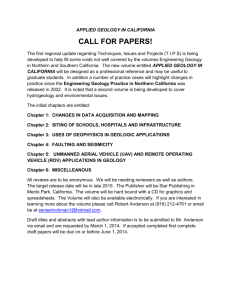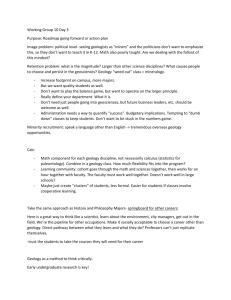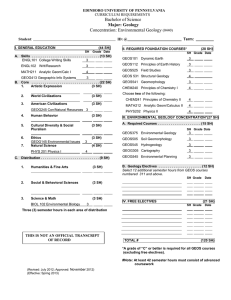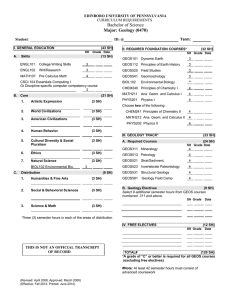STUDENT OUTCOMES ASSESSMENT UNIVERSITY OF NORTHERN IOWA The Bachelor of Arts in geology provides a wider choice of electives than the Bachelor
advertisement
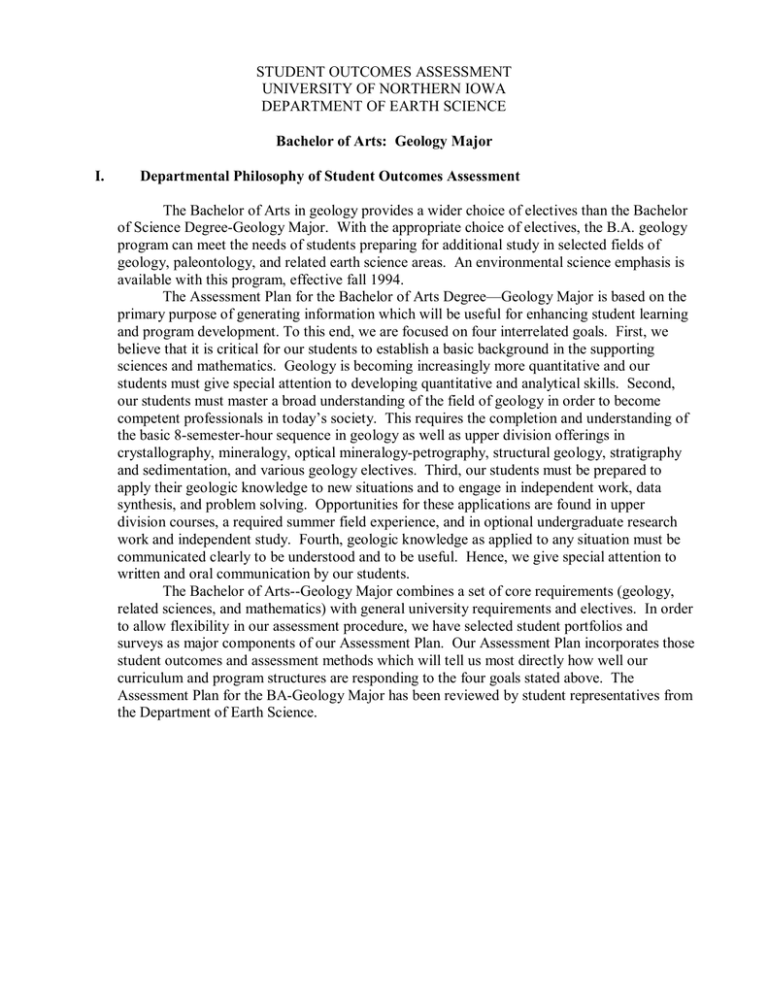
STUDENT OUTCOMES ASSESSMENT UNIVERSITY OF NORTHERN IOWA DEPARTMENT OF EARTH SCIENCE Bachelor of Arts: Geology Major I. Departmental Philosophy of Student Outcomes Assessment The Bachelor of Arts in geology provides a wider choice of electives than the Bachelor of Science Degree­Geology Major. With the appropriate choice of electives, the B.A. geology program can meet the needs of students preparing for additional study in selected fields of geology, paleontology, and related earth science areas. An environmental science emphasis is available with this program, effective fall 1994. The Assessment Plan for the Bachelor of Arts Degree—Geology Major is based on the primary purpose of generating information which will be useful for enhancing student learning and program development. To this end, we are focused on four interrelated goals. First, we believe that it is critical for our students to establish a basic background in the supporting sciences and mathematics. Geology is becoming increasingly more quantitative and our students must give special attention to developing quantitative and analytical skills. Second, our students must master a broad understanding of the field of geology in order to become competent professionals in today’s society. This requires the completion and understanding of the basic 8­semester­hour sequence in geology as well as upper division offerings in crystallography, mineralogy, optical mineralogy­petrography, structural geology, stratigraphy and sedimentation, and various geology electives. Third, our students must be prepared to apply their geologic knowledge to new situations and to engage in independent work, data synthesis, and problem solving. Opportunities for these applications are found in upper division courses, a required summer field experience, and in optional undergraduate research work and independent study. Fourth, geologic knowledge as applied to any situation must be communicated clearly to be understood and to be useful. Hence, we give special attention to written and oral communication by our students. The Bachelor of Arts­­Geology Major combines a set of core requirements (geology, related sciences, and mathematics) with general university requirements and electives. In order to allow flexibility in our assessment procedure, we have selected student portfolios and surveys as major components of our Assessment Plan. Our Assessment Plan incorporates those student outcomes and assessment methods which will tell us most directly how well our curriculum and program structures are responding to the four goals stated above. The Assessment Plan for the BA­Geology Major has been reviewed by student representatives from the Department of Earth Science. II. Outcomes and Competencies Outcome 1 Students shall become familiar with basic principles from mathematics and other sciences and of the relationship of these principles to the solution of geologic problems. Competency 1.1 Application of basic mathematical concepts through the level of Elementary Analysis or Calculus I. Competency 1.2 Application of the basic principles of chemistry through the level of General Chemistry II. Competency 1.3 Application of the basic principles of physics through the level of General Physics II or Physics II. Competency 1.4 Application of mathematics and science principles in required upper­division courses in geology. Outcome 2 Students shall become familiar with the basic principles of geology. Competency 2.1 Develop an understanding of the broad discipline of geology and its major subfields. Competency 2.2 Application of the major principles in crystallography and mineralogy, including the identification of minerals by physical, chemical, and x­ray methods. Competency 2.3 Application of the major principles in optical mineralogy­ petrography, including the identification of minerals by optical methods. Competency 2.4 Application of the major principles of structural geology, including understanding the mechanics of rock deformation and plate tectonics. Competency 2.5 Application of the basic principles of sedimentation, including the identification of common sedimentary rocks and interpretation of their environment of deposition. Competency 2.6 Application of additional principles in geology through study in selected upper division courses and electives. Outcome 3 Students shall pursue independent work, data synthesis, and problem solving. Competency 3.1 Be able to synthesize geological information and interpretations from multiple sources. Competency 3.2 Be able to successfully complete a summer field course in geology. Outcome 4 Students shall communicate orally and in written form according to the standards of the discipline. Competency 4.1 Be able to make an oral presentation to a group of peers which successfully communicates geologic understanding. Competency 4.2 Be able to create a written paper (or report) in conformance with discipline standards for scholarly publication and in keeping with common standards of expression for the English language. Measurement of Competencies (B.A. Geology) Competency Method of Measurement 1.1­­­­­­­­­­­­­­­­­­­­­­­­­­grades in required courses 1.2­­­­­­­­­­­­­­­­­­­­­­­­­­grades in required courses 1.3­­­­­­­­­­­­­­­­­­­­­­­­­­grades in required courses 1.4­­­­­­­­­­­­­­­­­­­­­­­­­­grades in required courses; observations by geology staff 2.1­­­­­­­­­­­­­­­­­­­­­­­­­­grades in required courses; observations by geology staff 2.2­­­­­­­­­­­­­­­­­­­­­­­­­­grades in required courses; observations by geology staff 2.3­­­­­­­­­­­­­­­­­­­­­­­­­­grades in required courses; observations by geology staff 2.4­­­­­­­­­­­­­­­­­­­­­­­­­­grades in required courses; observations by geology staff 2.5­­­­­­­­­­­­­­­­­­­­­­­­­­grades in required courses; observations by geology staff 2.6­­­­­­­­­­­­­­­­­­­­­­­­­­grades in required courses; observations by geology staff 3.1­­­­­­­­­­­­­­­­­­­­­­­­­­required term papers and other writing assignments in upper­level courses 3.2­­­­­­­­­­­­­­­­­­­­­­­­­­copy of transcript of geology summer field course; co student’s self evaluation of field course 4.1­­­­­­­­­­­­­­­­­­­­­­­­­­presentations in classes 4.2­­­­­­­­­­­­­­­­­­­­­­­­­­departmental writing requirement (see attached copy of “Writing in the Earth Sciences”) Understanding of competencies 1.1­2.6 will also be judged from the results of the (recommended) Graduate Record Examination. The GRE results will allow us to assess the standing of our graduates with a national audience and national norms. At the time of their graduation, students are invited to provide comments concerning the strengths and weaknesses of this program. The student’s advisor will prepare a summary statement for the portfolio, commenting on the progress and professional growth of the student. III. Frequency of Assessments With respect to a student’s undergraduate career, assessments will occur on an ongoing basis. Students are required to meet with their advisors once each semester, generally at the time of scheduling of classes. A post­graduation assessment in conjunction with UNI’s Office of Placement and Career Services will be conducted. Assessments began in the Spring 1992 semester for newly­ declared majors. IV. Methods of Assessment The primary mechanism for conducting assessments in the BA­Geology Program is a student portfolio (expanded advisement folder). When a student declares a major in the Department of Earth Science, the portfolio­based assessment plan will be introduced by the student’s advisor. The advisor will explain the purposes of the assessment portfolio, its intended contents, and the process by which it will be reviewed. The intent is to use the portfolio as a means to plan a comprehensive and cumulative course of learning for each student. Students majoring in the Department of Earth Science are required to meet with their advisor once each semester, normally in preparation for the scheduling of classes. scheduling of classes. The assessment portfolio was introduced on a trial basis, effective spring 1992. Contents and discussion related to the portfolio: To be added early in the advisement process: 1. High school GPA and class rank 2. ACT scores 3. University transcript 4. To be discussed at an early stage: 4. Statement of the student’s academic interests relative to geology and goals as currently conceived (provided by the student) 5. Proposed schedule of courses for the coming year 6. Overview of the required and elective courses for the student’s program To be added during the program: 7. Periodic degree audit and advisement reports 8. Summary statement by student’s advisor, commenting on the student’s progress professional growth 9. Copy of transcript from geology summer field course and the student’s self evaluation of the field­course program 10. Completion of questionnaire/exit interview at time of graduation 11. Copy of Graduate Record Examination Scores (if available): General test: Verbal Ability Quantitative Ability Analytical Ability Subject Test Geology ___________ ___________ ___________ ___________ The secondary mechanisms for conducting assessments in the BA­Geology Major are two student surveys. The first survey is a post­graduation survey. The Department will work with the Office of Career Planning and Placement to collect evaluative information from all recent graduates. In addition, the Department of Earth Science will also continue to request career information and comments of alumni as part of its annual departmental newsletter. The results from trial assessments conducted in the Spring Semester of 1992 were reported at the end of that semester to the University Student Outcomes Assessment Committee. Thereafter, results will be reported to the College Dean and Provost as requested. V. Analysis – Interpretation and Reporting of Results Each faculty advisor will be responsible for initiating the student portfolio process as described above in Section IV. The advisor and student are jointly responsible to have items 1­6 placed in the portfolio or discussed within three weeks of the time a student has declared a major in the Department of Earth Science. A complete copy of each student’s portfolio will be located within a departmental file (usually filed in the advisor’s office). The student may schedule an appointment to view the file as needed. The student may also keep a personal copy of the portfolio, if he/she desires. The advisor will monitor a student’s portfolio and work with the student to add required materials on a continuing basis. Students are required to meet with their advisor at least once each semester. During the student’s final semester prior to graduation, the advisor and student will meet to assess the success with which the stated outcome and competencies of the program have been achieved. Access to files is subject to the restrictions of Public Records Law. Suggested Advisor’s Checklist for Portfolio for B.A. Geology Major Name of Student:_____________________________________________ (Date entered or discussed) ___________ To be added early in the advisement process: 1. High school GPA and class rank ___________ 2. ACT scores ___________ 3. University transcript To be discussed at an early stage: ___________ 4. Statement of the student’s academic interests relative to geology and of career goals as currently conceived ___________ 5. Proposed schedule of courses for the coming year ___________ 6. Overview of courses and requirements for the duration of the student’s program To be added during the program: ___________ 7. Periodic degree audit and advisement reports ___________ 8. Summary statement by advisor, commenting on the student’s progress and professional growth ___________ 9. Copy of transcript from geology summer field course and the student’s self evaluation of the field­course program ___________ 10. Completion of questionnaire/exit interview at the time of graduation ___________ 10. Copy of Graduate Record Examination Scores (if available): General Test Verbal Ability Quantitative Ability Analytical Ability Subject Test Geology _________ _________ _________ _________ Advisor’s summary statement, commenting on the student’s progress and professional growth: _______________________________________________________________________________ _______________________________________________________________________________ _______________________________________________________________________________ _______________________________________________________________________________ _______________________________________________________________________________ _______________________________________________________________________________ _______________________________________________________________________________ _______________________________________________________________________________ _______________________________________________________________________________ _______________________________________________________________________________ _______________________________________________________________________________ _______________________________________________________________________________ _______________________________________________________________________________ _______________________________________________________________________________ _______________________________________________________________________________ _______________________________________________________________________________ _______________________________________________________________________________ _______________________________________________________________________________ _______________________________________________________________________________ ____________________ After an advisee has graduated, the student’s advisor transfers the advisement portfolio to the Department Office for filing. W ACROSS I THE CURRICULUM N G WRITING IN THE EARTH SCIENCES Department of Earth Science University of Northern Iowa Cedar Falls, IA 50614­0335 INTRODUCTION Why is writing important in the earth sciences? Students graduating with undergraduate majors in geology, earth science, and earth science­teaching will likely pursue careers in industry, teaching, research, public service, or related fields. Writing and communication skills are essential for our graduates in whatever careers they choose. Writing is a skill that can always be improved. Few persons can be truly artists in writing, but with instruction and practice, nearly all persons can become reasonably­competent communicators through the written word. In the attempt to provide the best possible education for our majors, and in consultation with the University Writing Committee and colleagues across the University, the Department of Earth Science actively promotes the development of writing skills in its major courses. UNIVERSITY WRITING REQUIREMENT All students at UNI must successfully complete “Introduction to College Writing” which provides the writing background for all majors. A degree of writing competency is assumed at this point, but further development of the skill is done within the major courses. WRITING PRACTICES IN THE DEPARTMENT OF EARTH SCIENCE 1. Term papers, or other writing assignments, are required of all students in upper­level courses. These required papers stress effective communication as well as understanding of content. In most courses, draft copies of papers are reviewed by the instructor and improvements to the writing are suggested. All students are encouraged to use word processors in their writing. In several courses, use of a computer or word processor is mandatory. The Department of Earth Science was one of the first departments at UNI to provide departmental facilities for student computing and word processing. 2. An undergraduate research paper is required of those students pursuing the B.S. degree in geology. This paper is reviewed by the student’s research advisor and a second faculty reader. Research results are presented orally at a public meeting, and students are encouraged to submit abstracts of their papers to appropriate journals and proceedings. 3. Because the writing done in one’s career is often done jointly with colleagues, one upper­ level course provides an opportunity to write in this kind of setting. Here, the audience is someone different from the instructor or other professional in the field. The target audience may be a concerned segment of the public, a decision­making body, or a public official. Not only do the students have the opportunity to write, but they must also be able to contribute to the larger project through their writing. Students get a chance to observe what happens when this dynamic group process occurs, which is a very different experience from writing term papers individually. 4. Part of the very process of learning involves organization of thoughts and reinforcement of basic principles of the subject. Writing forces one to sort through one’s myriad thoughts and to organize these into coherent pieces of the larger whole. Exploratory writing, writing laboratory reports, journal keeping, and essay examinations are routinely included in upper­ division earth science courses to promote this kind of learning. 5. Written communication serves two parties: the writer and the reader. Developing skill in writing also increases one’s ability to critically analyze the writing of others. For this reason, assignments are made in some earth science courses that require critical reviews of research papers. DEPARTMENT OF EARTH SCIENCE WRITING REQUIREMENTS The Department of Earth Science shall monitor the writing abilities of its majors through the writing assignments in upper­division courses. If a student’s writing in departmental courses is judged by the instructor(s) to be substandard, corrective action will be suggested by the student’s advisor. Substandard writing ability means the student is unable to organize and communicate useful thoughts about a technical subject, especially earth science, and/or fails to have a command of standard American English. Corrective action might include additional practice in writing under departmental supervision, enrollment in an appropriate course in the Department of English, or referral to the Writing Center. The Department of Earth Science shall devote one staff meeting per year to the topic of “Student Writing”. Model practices and papers will be examined, and problems for further study will be identified.
